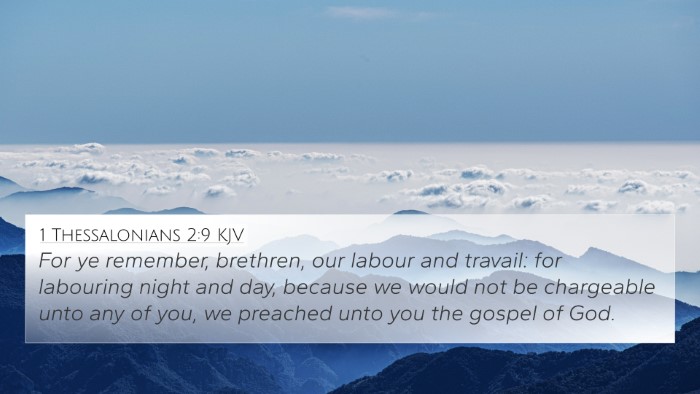Understanding 1 Corinthians 9:6
1 Corinthians 9:6 states, "Or I only and Barnabas, have not we power to forbear working?" This verse touches on the rights of apostles and laborers in the Lord's vineyard, particularly focusing on the need for support from the church community.
Summarized Insights from Commentaries
Several public domain commentaries provide valuable insights into this verse:
-
Matthew Henry:
Henry emphasizes the context of Paul’s defense regarding his authority and labor. He argues that it is common for those who preach the gospel to receive support from those they minister to. Paul and Barnabas, despite their rights, chose not to burden the church, showcasing humility and a desire to avoid hindrance to the Gospel.
-
Albert Barnes:
Barnes notes the significance of the question posed, underlining the idea that Paul, like any worker, has the right to refrain from laboring in secular jobs to focus on spiritual tasks. He argues that Paul’s example serves not only to remind the Corinthians of appropriate support for ministers but also illustrates the model of self-sacrifice in proclaiming the Gospel.
-
Adam Clarke:
Clarke elaborates on the apostolic rights of Paul and Barnabas. He underscores that while they had the authority to demand support for their ministry work, they chose not to exercise this right to avoid any perception of greed or self-interest, thus setting a powerful example of selflessness and dedication to their calling.
Key Themes and Connections
1 Corinthians 9:6 highlights several crucial themes within the Christian faith, including:
- Rights of the Apostles
- Self-Sacrifice for the Gospel
- Mutual Support within the Church
- Humility in Ministry
Bible Verse Cross-References
This verse intersects with numerous other biblical texts, reinforcing its themes and teachings:
- 1 Timothy 5:18: "For the Scripture says, 'You shall not muzzle an ox when it treads out the grain,' and, 'The laborer deserves his wages.'" - This outlines the right to support for those preaching.
- Galatians 6:6: "Let the one who is taught the word share all good things with the one who teaches." - This emphasizes reciprocal support between the teacher and the learner.
- Luke 10:7: "And remain in the same house, eating and drinking what they provide, for the laborer deserves his wages." - Another reinforcement of the concept of compensation for ministry work.
- Romans 15:27: "They were pleased to do it, and indeed they owe it to them. For if the Gentiles have come to share in their spiritual blessings, they ought also to be of service to them in material blessings." - This discusses the debtor relationship that the Gentiles have towards the Jewish believers for their spiritual teachings.
- 2 Corinthians 11:8-9: "I robbed other churches by accepting support from them in order to serve you." - Paul's use of support from other churches to serve the Corinthians illustrates his commitment to them.
- Philippians 4:15-16: "And you Philippians yourselves know that in the beginning of the gospel, when I left Macedonia, no church entered into partnership with me in giving and receiving, except you only." - The commendation of the Philippian church for their support echoes Paul's teachings in 1 Corinthians.
- Acts 20:33-35: "I coveted no one's silver or gold or apparel. You yourselves know that these hands ministered to my necessities and to those who were with me." - Paul’s reminder of his own example in laboring without burdening the church reinforces his teachings on self-support and dedication.
Thematic Bible Verse Connections
The exploration of these connections leads to greater understanding of Paul's teachings in context:
- Selflessness modeled by Christ (Philippians 2:5-8)
- Unity in diversity within the church (1 Corinthians 12:12-26)
- The importance of love in service (1 Corinthians 13)
Conclusion
1 Corinthians 9:6 is a powerful scripture that advocates for the rights of those in ministry while simultaneously exemplifying humility and selflessness. By cross-referencing related biblical texts, we gain a deeper understanding of how this theme reverberates throughout Scripture. Thus, utilizing a strong Bible cross-reference system enhances our grasp of such significant teachings.
Tools for Bible Cross-Referencing
Understanding how to find these connections is paramount for anyone seeking to engage with the Bible deeply. Resources such as Bible concordances, cross-reference guides, and systematic approaches to Bible study will aid in uncovering the links between scriptures effectively.













